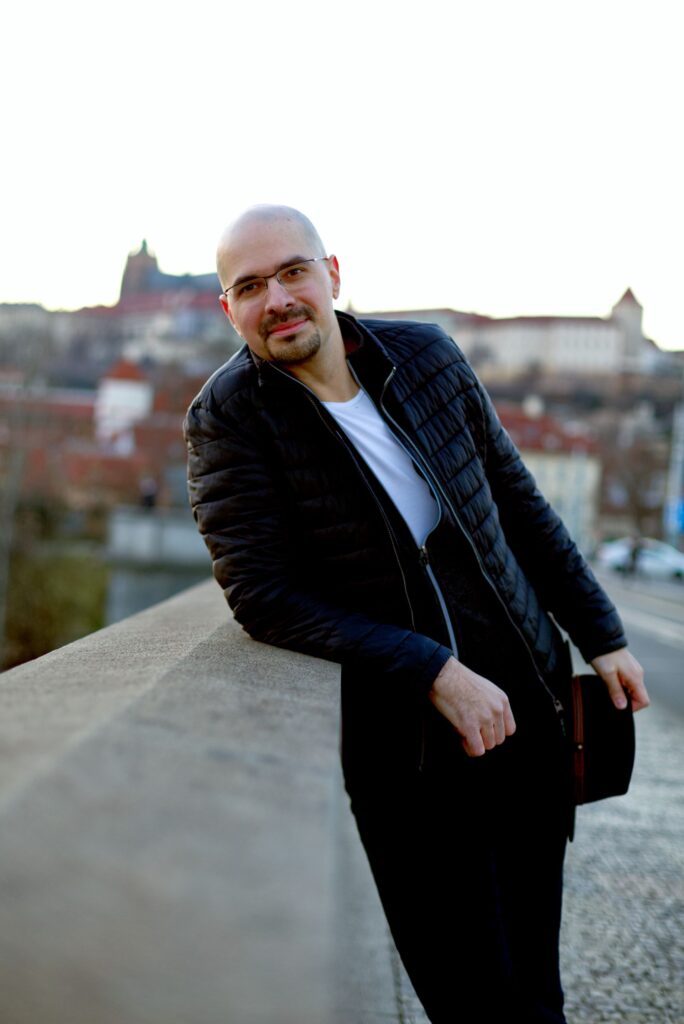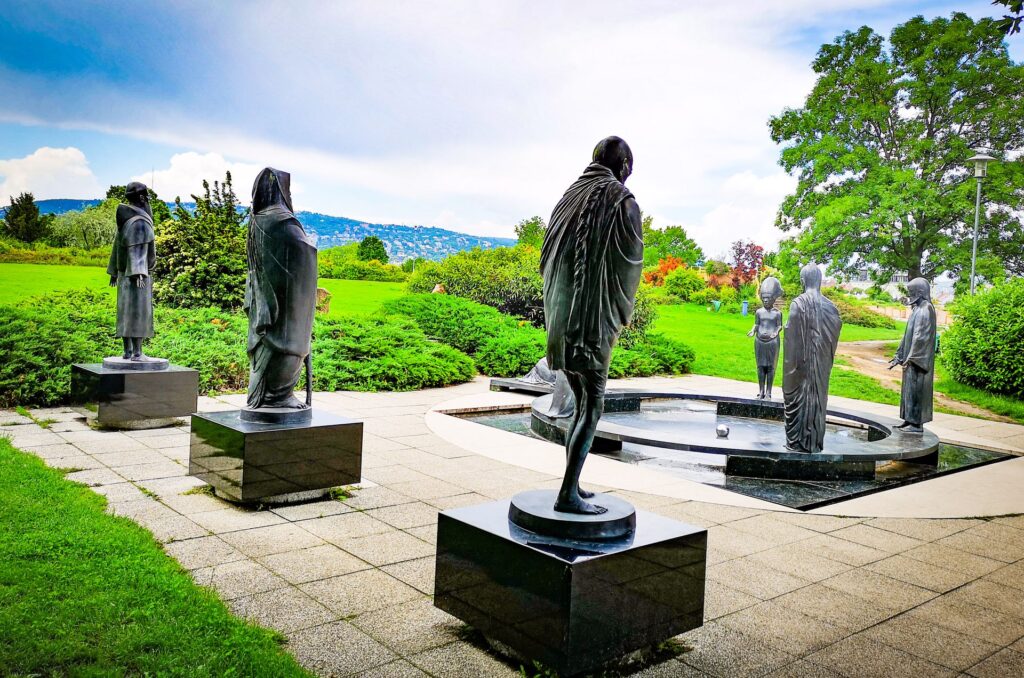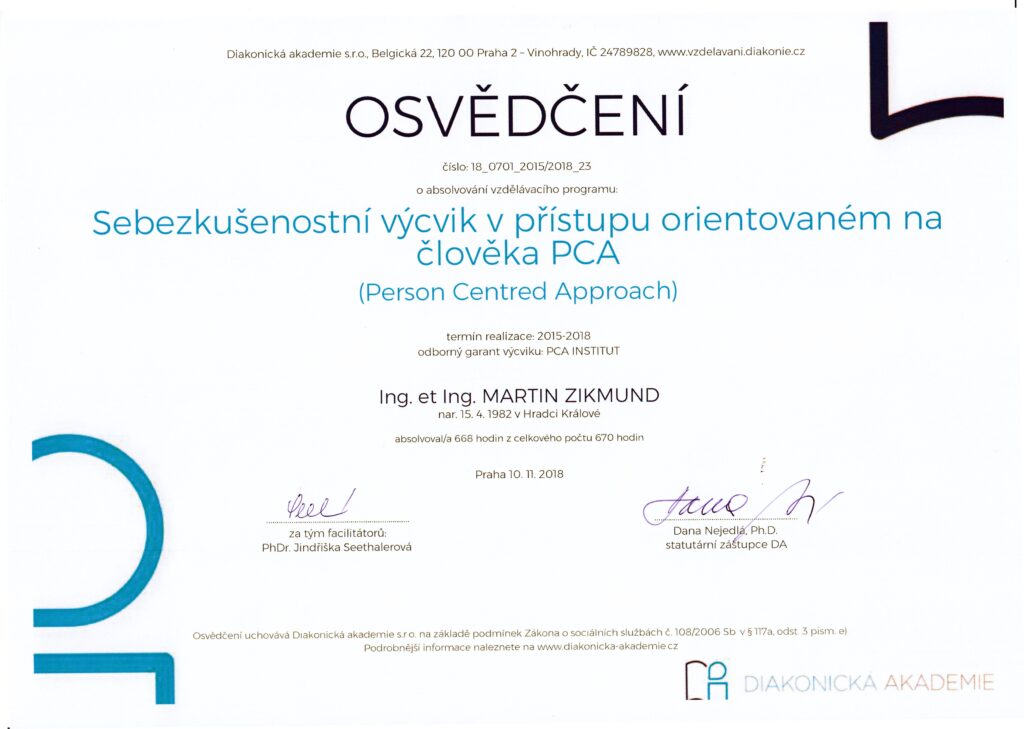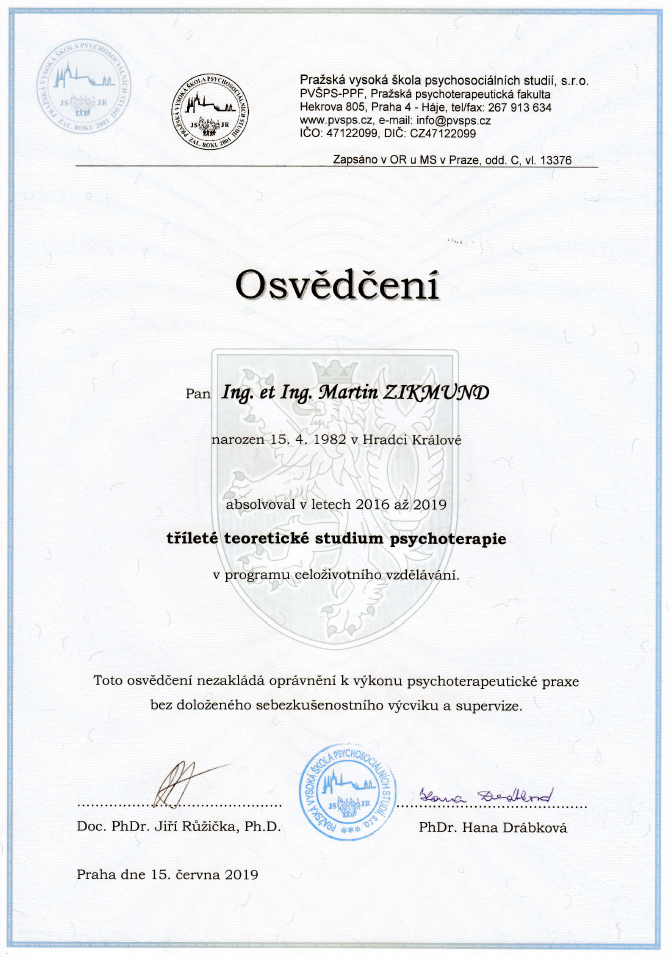Who am I
Answering to this question – who the person actually is – is not as easy as it may seem at the first glance. Many people will never find their answer during their entire lives. People often ask me how did I get to what I’m doing today. What was the initial impulse to move from the world of telecommunication technology and later marketing communications to a helping profession…

When I was a little boy I just loved the world of technology. I was a geek long before this word started to be used. Originally, I wanted to be a fighter pilot, but then I had been overwhelmed by the world of computers to later, around the age of 18, got to the amazing world of telecommunications. Few years later, strategy management has become my secret love. Implementing it, supporting marketing departments and helping to sell key products, all of this I could experience by myself to encounter that many things and hidden processes in business follow strict yet logical rules and orders. But then something has changed. On one of my journeys across Europe, all of this suddenly didn’t make sense to me anymore.
I discovered that I hadn’t lived my own life. I’d lived the one from magazines instead. I’d played even golf and had been flying to ‘business trips’ abroad. All of this despite the fact that during my studies and my career there were always visible signs of my future, at this time current, path. Both during high school and my first university I really loved taking psychology classes. At my second university I just fell in love with the world of HR, management and coaching. During my work in marketing communications for large corporations I got to know closely over 300 companies and listened to their stories and stories of their owners, managers and employees. And these stories were far from being just about the work. And when I was introduced to science, the structure and processes inside human brain and organisms during my master and doctoral studies in the field of bionanomedicine, the missing piece of the jigsaw puzzle leading to my current field of work was complete. Only one piece was missing. But I’ve been looking for it for many years.

Eventually, I ‘traveled through’ to him. I remember the first step like today – I walked across Gellért (the hill above the town) in Budapest and met there a girl who told me her whole life story within few hours talk. She worked for one big corporation, but her heart was lying in a quite different area than in financial controlling. And this girl was only the first in a long line of people who suddenly turned to me. Since then it kept happening to me all the time. And in most cases those people describing me all of a sudden their deepest believes and sorrows were complete strangers to me. In café, restaurant, on the street, in sauna, even in the elevator and, of course, during my travels across Europe – they were just openly confiding to me. All these people, who suddenly opened their hearts to me had one thing in common – they felt they could not stand their lives the way they were living them. That it was a time for a change! They were people who were urgently looking for someone who would understand them and help them to take the first step. Someone who would support and encourage them. Someone they could finally trust and who would become their guide through the change. They were looking for someone to provide them with the right environment that would enable them to get closer to themselves. And for some reason they’ve all picked me. The last piece of the jigsaw puzzle was eventually hidden in the middle of Austrian Alps, where I totally coincidentally wenth through the initiation to an ancient technique of meditation – Kriya Yoga.
When the jigsaw puzzle was folded and I came to see what had been hidden before, there was only one last, and the most important, thing left – to gain the necessary skills because I wanted to help people not to hurt them. On the recommendation of a friend who graduated from psychology in London, I started a four-year self-experience training in Person-Centered Approach by Carl Ransom Rogers, and a year later I started to study at the Prague Psychotherapeutic Faculty. It seemed to me as a safer choice for my future clients than to undergo just a 40- or 100-hour coaching course. Those hundreds of hours of self-experience training and seminars (so far 994 hours) and hundreds of theory hours (so far 587 hours) were ultimately the best investments in life. In addition, I met dozens of top psychotherapists, psychologists and other great people, many of whom I consider being my friends today.
My Cornerstones

In the person-centered approach (PCA), or if you want Rogerian psychotherapy, I attended an intensive four-year training at Diakonie CČE, total of 668 training hours. In addition, however, every year I also take tens of hours of other self-experience seminars in various other psychotherapeutic approaches (most so far in daseinsanalysis, dance and movement therapy and hagiotherapy). I believe that each of the proven psychotherapeutic approaches has something to offer to my clients.
However, besides 1055 hours of self-experience training and seminars, I also devoted considerable effort to formal education. I graduated from a three-year study program at the Prague Psychotherapist Faculty at Prague College of Psychosocial Studies, and attended variety of online courses at a number of prestigious foreign universities such as UC Berkeley, Yale, Princeton and others. I also spend hundreds of hours a year by studying from books or directly from scientific studies.

The first university taught me to honor the science-based and evidence-based approach. Neuropsychology, psychoneuroimmunology, psychooncology, cognitive psychology, developmental psychology, positive psychology – all these and many other disciplines offer important knowledge that can demonstrably help us feel better in life and get better understanding of some of the patterns and interdependencies. That is the reason why I also work with these findings.
At the same time, however, in my heart I’m a spiritual person. I have had a lot of interesting and empowering experiences, from clinical death, throughout all sorts of other experiences from my life and my travels. I feel also close to meditation, Buddhism and Christianity, including Christian mysticism. My friends include a few Catholic and Evangelical priests. But I am not a Christian, I consider myself an agnostic. In my work and life I see science and spirituality as tightly connected one to another, as do many famous psychotherapists and psychiatrists of the 20th and 21st century as well as numerous priests.
My philosophy
‘When you’re going through hell keep going,’ says the quote often attributed to Winston Churchill. For many people this ‘hell’ is real. Yet, I can’t agree with this quote. Making a break is sometimes important, to recharge your batteries for instance and sometimes to realize that the way out is just behind the corner. Despite that many people are running each and every day as guinea pigs in a wheel. How many people have a lot of unpleasant experiences and life situations in life that keep repeating again and again. Applying more pressure often does not help, quite the contrary.
In addition, the journey through hell can be quite long. That is why I personally stick with a different philosophy: ‘When you’re going through hell, at least roast some marshmallow.‘ So I help people who are going through their personal hell to find their way how to live a better life, how to make it “nicer”, here and now – not ‘after something happens’ or ‘something ends’. But it doesn’t need to be just about being in hell. Also people who are doing well in their lives approach me, because they feel that their lives could get even better. Unfortunately, our brain was ‘designed’ to help us survive, not to help us achieve happiness. Therefore, it is always necessary to make some effort to start to feel better in your life.
My Education
I originally graduate from telecommunication engineering at Faculty of Electrical Engineering at the Czech Technical University in Prague. There I also first ‘sniffed’ to biomedicine and neurophysiology. At the same faculty, I also continued with my doctoral studies focused on bionanomedicine. But I left my Ph. D. unfinished. In parallel with my Ph. D. studies, I graduated from business and management of industrial companies at Masaryk Instituted of Advanced Studies at the Czech Technical University in Prague. Here I came back to the less tangible part – the human psyche – human resources, management, leadership and coaching. But the essential part of my education came much later.
Institutional Education
- Education at Prague Psychotherapist Faculty (2016-2019)
- PCA Self-experience training (Rogerian Psychotherapy), 668 hours, Diakonie CČE (2015-2018)
Self-experience Seminars
- Self-experience Seminar Rational emotive behavior therapy, 17 hours, associate prof. PhDr. Karel Balcar, CSc. (2019)
- Seminar Psychotherapy of Eating Disorders, 17 hours, PhDr. František David Krch, Ph. D. (2019)
- Seminar Oncological Diseases and Human Psyche, 12 hours, MUDr. Olga Dostálová (2018-2019)
- Seminar Selected Chapters from Medical Science, 12 hours, MUDr. Olga Dostálová (2018-2019)
- Self-experience Seminar Biodynamic Massage, 17 hours, Mgr. Johana Špicnerová, Mgr. Martina Ambrožová (2018)
- Self-experience Seminar Transactional Analysis, 17 hours, PhDr. Jiří Libra (2018)
- Self-experience Seminar Psychotherapy and Shamanism, 17 hours, Mgr. Pavla Štěpničková (2018)
- Self-experience Seminar Help in crisis, 17 hours, Mgr. Alexandra Černá Lammelová (2018)
- Seminar Diagnostics and Treatment of Addictions, 12 hours, Petr Popov MD MHA (2018)
- Self-experience Seminar Dance and Movement Therapy, 17 hours, Radana Syrovátková MD (2017)
- Self-experience Seminar Dramatization Methods in Psychotherapy, 17 hours, associate prof. PhDr. Karel Balcar, CSc. (2017)
- Self-experience Seminar Existential Therapy, 17 hours, associate prof. PhDr. Karel Balcar, CSc. (2017)
- Self-experience Seminar Art Therapy, 17 hours, PhDr. Ingrid Hanušová, Ph. D. (2017)
- Self-experience Seminare Daseinsanalysis, 51 hours, Mgr. Jakub Zlámaný, Ph. D. (2016-2017)
- Self-experience Seminare Hagiotherapy, 49 hours, Prokop Remeš MD (2016-2017)
- Seminar Dream Interpretation, 15 hours, associate prof. PhDr. Jiří Růžička, Ph. D. (2016-2017)
- Self-experience Seminar Gestalt Therapy, 17 hours, Marie Štefanová MD (2016)
- Seminar Cognitive Behavioral Therapy of Anxiety Disorders, 12 hours, Mgr. Katarína Durecová (2016)
Self-Experiential Online Courses
- Health Behavior Change: From Evidence to Action, 20 hours, associate prof. Marney White, Ph. D., MS, Yale school of Public Health, Yale University (2021)
- Existential Well-being Counseling: A Person-centered Experiential Approach, 89 hours, KU Leuven, Prof. Mia Leijssen, associate prof. Siebrecht Vanhooren (2018)
- De-Mystifying Mindfulness (Mindfulness Based Stress Reduction), 35 hours, Universiteit Leiden, Prof. Dr. Chris Goto-Jones (2018)
- Science of Happiness, 47 hours, UC Berkeley, Dacher Keltner, Ph. D., Emiliana Simon-Thomas, Ph. D. (2017)
- Science and Practice of Yoga, 27 hours, University of Texas, Arlington, Stacy Dockins, Catherine Spann, Ph. D., prof. George Siemens, Ph. D. (2017)
Educational online courses
- Overcoming Dyslexia, 16 hours, prof. Sally E Shaywitz, Yale School of Medicine (2022)
- Infant Formula Feeding, 8 ECME credits, prof. Berthold Koltetzko, Ludwig-Maximilians-Universität München (2022)
- Nutrition and Lifestyle During Pregnancy, 13 ECME credits, prof. Berthold Koltetzko, Ludwig-Maximilians-Universität München (2022)
- Understanding child development: from synapse to society, 24 hours, doc. Jorg Huijding, Universiteit Utrecht (2022)
- Breastfeeding, 6 ECME credits, prof. Berthold Koltetzko, Ludwig-Maximilians-Universität München (2022)
- Addicted Brain, 24 hours, prof. Michael J. Kuhar, Emory University (2022)
- Introduction to Self-Determination Theory, 30 hours, prof. Richard M. Ryan, University of Rochester (2022)
- Schizophrenia, 12 hours, prof. Matt Kurz, Wesleyan University (2022)
- Resilience in Children Exposed to Trauma, Disaster and War: Global Perspectives, 30 hodin, prof. Ann Masten, University of Minnesota (2022)
- Sleep: Neurobiology, Medicine and Society, 35 hours, prof. Ralph Lydic + prof. Helen Baghdoyan, University of Michigan Medical School, University of Michigan (2021)
- Addiction Treatment: Clinical Skills for Healthcare Providers, 15 hours/10 CEU credits, Ellen Edens, MD + Shannon Drew et al., MD, Yale School of Medicine, Yale University
- Nutrition and Lifestyle in Pregnancy, 10 hourse, prof. Berthold Koletzko, Ludwig-Maximilians-Universität München
- Everyday Parenting: The ABC’s of Child Rearing, 19 hours, Yale University, Prof. Alan Kazdin (2018)
- Positive Psychology, 12 hours, University of North Carolina at Chapel Hill, Barbara L. Fredrickson, Ph. D. (2017)
- Buddhism and Modern Psychology, 18 hours, Princeton University, Robert Wright (2017)
What I do
Appart from working individually with clients, I give lectures for companies and other organizations. I have long been cooperating with the National Institute of Public Health and the Research Institute of Occupational Health and Safety on projects in the field of increasing employee resilience and preventing psychosocial risks, and I occasionally give lectures for the Czech Medical Chamber, the Ministry of Education and Science, the Faculty of Arts of Charles University or the General University Hospital in Prague. Most of my free time is currently devoted to the 13 Sins of Parenting project and when I can, I try to devote myself to my other projects.
Besides that, in my free time I try to dedicate myself to healthy exercise, traveling, photography, meditation and most importantly my family.

